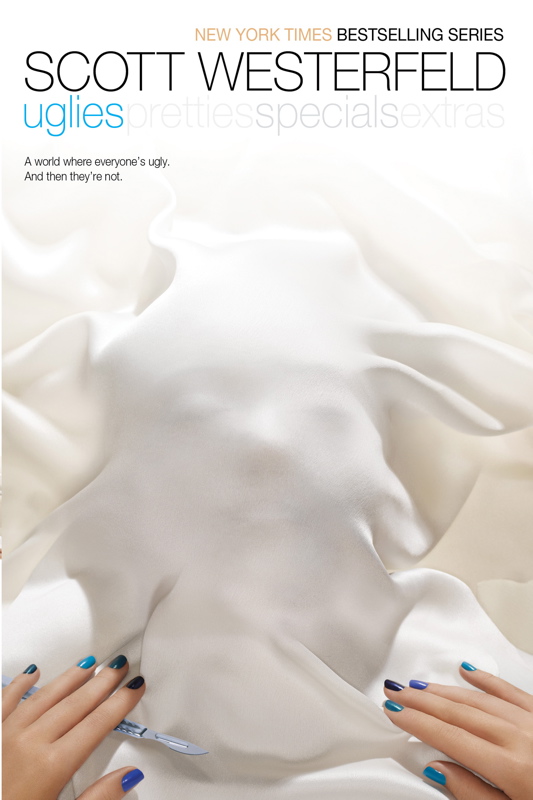It’s a bit embarrassing for me to declare my love for a YA novel, but I am utterly proud of loving this book. Uglies by Scott Westerfeld is the book that ignited my desire to work in the publishing industry. It was the first book that I felt personally connected to. After reading it almost ten years ago, I realized that you could find a friend in books. Uglies challenged my views and supported me through my insecurities, and it was amazing to me that a book was able to do that. I wanted to be a part of that world—a world where words are that strong. (And I was thrilled to work on a reprint for it this past year!) This novel was among a string of dystopian novels I read in middle school, but it was so unique and memorable for its flawed heroine, hip slang, and premise.
Uglies is actually the first of a series, which includes Uglies, Pretties, Specials, and Extras. Scott Westerfeld introduces us to a strangely seductive dystopia: Everyone in this world is subject to a complete and utter cosmetic surgery makeover when they turn sixteen. Pre-surgery children are called uglies, and post-surgery, they’re called pretties. Uglies live in dorms, impatiently waiting for their sixteenth birthday, exploring and doing daring tricks to pass the time. They’re encouraged to call each other ugly until then, using nicknames like “Fat nose” and “Squinty.” After the pretty-making surge (à la Uglies slang), the newly transformed pretties pack up to live in Prettyland, where everyone lives a luxurious life that consists of feasting, drinking, and playing, separated from the uglies. They don’t have to worry about how they’re going to afford anything, either—everything is supplied and paid for by the government, including the surgery. I’m not going to lie—I did live a little vicariously through the descriptions of the extravagant pretty life.
Still, there’s something suspicious about this pretty procedure, and that’s exactly what the protagonist, Tally Youngblood, stumbles upon. After her new friend, Shay, runs away and skips out on the pretty-making surge, Tally is blackmailed by a secret government organization, known as “Special Circumstances”: They are going to withhold her pretty surgery until she brings Shay back. But why did Shay run away in the first place? Even though Tally’s been taught all her life to despise her face, she’s not buying this pretty-making surge. Why does it also transform the uglies’ personalities? Why are pretties so complacent and happy with an empty, beautiful life, filled with nothing but parties and brunches? In this first novel, Tally is torn between becoming pretty and fighting for her “ugliness”—and you find out what that really means.
Tally Youngblood is a relatable and admirable character—she sticks to her conscience, acts on her principles, and never gives up, even though she does mess up and has to deal with terrible consequences. She strives to be her best, but upsets Shay by upstaging her. She struggles to be authentic and loyal as she decides between being ugly and being pretty, literally destroying lives in the process. Although being beautiful and pampered sounds like a dream, Tally looked past this and showed me what is actually enviable.
A lot of popular novels and films about a lone heroine battling a monster dystopian society have come into the limelight recently—think The Hunger Games and Divergent—and Uglies is undeniably similar in that aspect. You could even argue that Uglies is their predecessor. What sets Uglies apart, though, is that it challenges you to think about how and why physical appearances matter. It asks is sacrificing your individuality worth it for perfection? Is changing a unique trait of yours worth it to fit in with everyone else? Is standing out for being different really a bad thing?
At a time in my life when girls were starting to wear makeup and form superficial cliques, Tally, who recognized the qualities of real beauty, was a comfort to read about. She was someone who dismissed physical appearances and focused on things that mattered to her. She was someone I aspired to be like.









